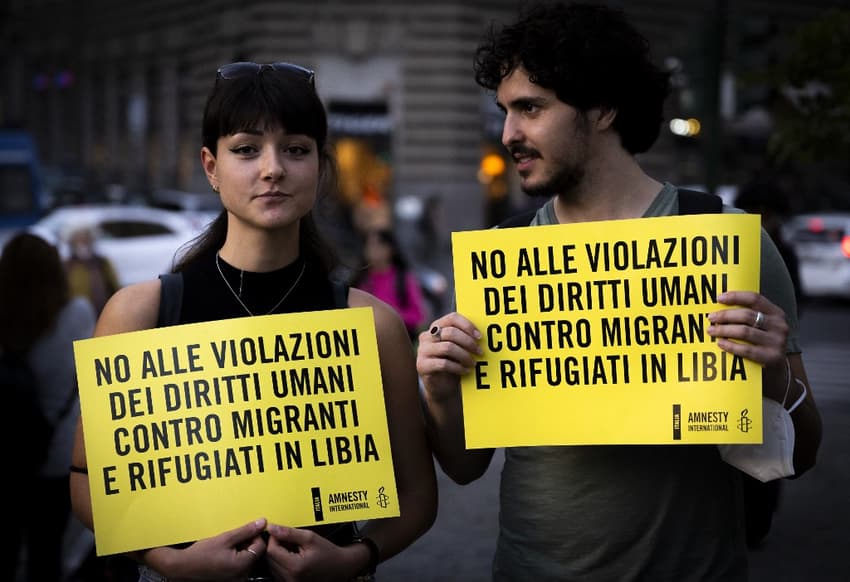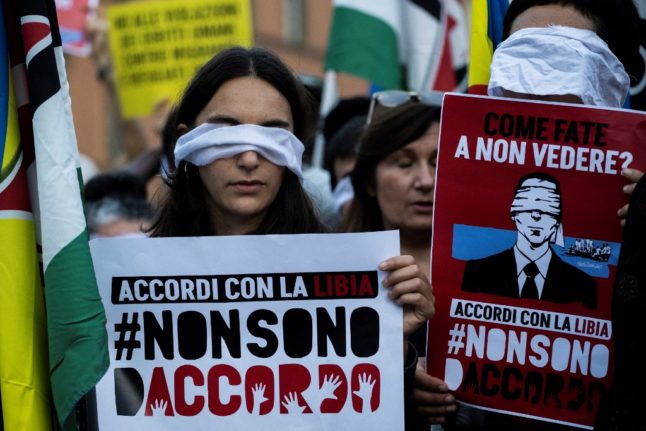Aid groups urge Italy to scrap migrant return deal with Libya

Humanitarian groups including Save the Children and Amnesty International are urging Italy's new government to scrap a controversial EU-sponsored deal with Libya to stop migrant boat crossings to Europe.
Under the 2017 accord, Italy and the EU help fund, train and equip the Libyan coastguard, which then intercepts migrants in the Mediterranean and forcibly returns them to the strife-torn country.
"Europe, defender of human rights, should under no circumstances make deals with a country... where migrants are tortured, become victims of slavery or of sexual abuse," Claudia Lodesani, head of Doctors Without Borders (MSF) in Italy, told a press conference in Rome.
Campaigners say nearly 100,000 people have been intercepted in this way over five years.
Many are believed to have ended up in Libyan detention centres, compared by Pope Francis to concentration camps.
Critics lament a lack of accountability, with no public information on who receives the money in Libya, while rescuers slam a "Wild West" situation with armed militias posing as the Libyan coastguard.
READ ALSO: Italy’s government moves to block migrant rescue ships as distress calls reported
The appeal by 40 organisations including Save the Children, Doctors Without Borders and Amnesty, calls for urgent action by Italy's new hard-right government, which was sworn in at the weekend
"Migrants and asylum seekers held in detention centers remain subject to abhorrent conditions, and face serious abuses including torture and rape, as well as overcrowding. Further, their lives remain at risk due to the escalation of the ongoing conflict," stated Amnesty International in its appeal for the deal to be scrapped.
If Rome does not scrap the agreement by November 2nd, it will be automatically renewed for another three years.

Protestors hold a sign reading 'agreements with Libya, I do not agree' during a demonstration in Rome on October 26th. Photo by Tiziana FABI / AFP
In her inaugural speech to parliament, Italy’s new prime minister Giorgia Meloni said she wanted to “stop illegal departures and break up human trafficking,” adding that her government intends to propose an EU naval operation to block departures from North Africa.
The new interior minister on Wednesday signalled a return to the policy of blocking rescue ships, favoured by League leader Matteo Salvini, as he signed a directive seeking to ban two migrant rescue ships from entering Italian waters, as more vessels issued distress calls off the coast of Sicily.
It stated that “the prohibition of entry into territorial waters is being evaluated".
Italy has long been on the migration frontline, taking in tens of thousands of people who attempt the world's deadliest crossing yearly.
It had numerous agreements during the 2000s with Libyan dictator Moamer Kadhafi on curbing migratory flows.
READ ALSO: Immigration in Italy: What are the real numbers?
The partnership was suspended following the collapse of the Libyan government and the European Court of Human Rights' 2012 condemnation of Italy for intercepting and forcibly returning people to Libya.
But wars in Syria, Iraq and Libya sparked a wave of refugees in 2015, with over 150,000 people crossing in boats to Italy, followed by over 180,000 people in 2016. Thousands more died trying.
In 2017, Italy's centre-left prime minister Paolo Gentiloni signed a new deal with Fayez al-Serraj, head of the UN-backed Libyan Government of National Accord, aimed at reducing arrivals.
From then onwards, rescue charities including the Alarm Phone hotline used by migrants in distress were "told by Italy to alert the Libyan coastguard instead", Chiara Denaro from Alarm Phone said.
She said it was "not possible to consider the forcible return of people desperate to flee".
The so-called coastguard "fire weapons, they perform dangerous manuevers that risk causing shipwrecks... We can describe the returns as captures, as pushbacks, but not as rescues," she added.
On Wednesday, rescue organisation Sea Watch published video footage appearing to show the Libyan coastguard threatening to "shoot missiles" at their plane.
🔴 BREAKING: The so-called Libyan coast guard threatens our airplane crew with force of arms in the Maltese search and rescue zone: "Get away from Libyan territory, otherwise we will shoot you by some missiles."
The EU's partner's at work in violation of international law: pic.twitter.com/74NaQQyNy0
— Sea-Watch International (@seawatch_intl) October 26, 2022
The EU has contributed 58 million euros to date to the accord with Libya.
Investigative Italian journalist Duccio Facchini on Monday revealed Italy had spent another 6.65 million euros on 14 new speedboats for the Libyan coastguard just a few months ago.
Comments
See Also
Under the 2017 accord, Italy and the EU help fund, train and equip the Libyan coastguard, which then intercepts migrants in the Mediterranean and forcibly returns them to the strife-torn country.
"Europe, defender of human rights, should under no circumstances make deals with a country... where migrants are tortured, become victims of slavery or of sexual abuse," Claudia Lodesani, head of Doctors Without Borders (MSF) in Italy, told a press conference in Rome.
Campaigners say nearly 100,000 people have been intercepted in this way over five years.
Many are believed to have ended up in Libyan detention centres, compared by Pope Francis to concentration camps.
Critics lament a lack of accountability, with no public information on who receives the money in Libya, while rescuers slam a "Wild West" situation with armed militias posing as the Libyan coastguard.
READ ALSO: Italy’s government moves to block migrant rescue ships as distress calls reported
The appeal by 40 organisations including Save the Children, Doctors Without Borders and Amnesty, calls for urgent action by Italy's new hard-right government, which was sworn in at the weekend
"Migrants and asylum seekers held in detention centers remain subject to abhorrent conditions, and face serious abuses including torture and rape, as well as overcrowding. Further, their lives remain at risk due to the escalation of the ongoing conflict," stated Amnesty International in its appeal for the deal to be scrapped.
If Rome does not scrap the agreement by November 2nd, it will be automatically renewed for another three years.

In her inaugural speech to parliament, Italy’s new prime minister Giorgia Meloni said she wanted to “stop illegal departures and break up human trafficking,” adding that her government intends to propose an EU naval operation to block departures from North Africa.
The new interior minister on Wednesday signalled a return to the policy of blocking rescue ships, favoured by League leader Matteo Salvini, as he signed a directive seeking to ban two migrant rescue ships from entering Italian waters, as more vessels issued distress calls off the coast of Sicily.
It stated that “the prohibition of entry into territorial waters is being evaluated".
Italy has long been on the migration frontline, taking in tens of thousands of people who attempt the world's deadliest crossing yearly.
It had numerous agreements during the 2000s with Libyan dictator Moamer Kadhafi on curbing migratory flows.
READ ALSO: Immigration in Italy: What are the real numbers?
The partnership was suspended following the collapse of the Libyan government and the European Court of Human Rights' 2012 condemnation of Italy for intercepting and forcibly returning people to Libya.
But wars in Syria, Iraq and Libya sparked a wave of refugees in 2015, with over 150,000 people crossing in boats to Italy, followed by over 180,000 people in 2016. Thousands more died trying.
In 2017, Italy's centre-left prime minister Paolo Gentiloni signed a new deal with Fayez al-Serraj, head of the UN-backed Libyan Government of National Accord, aimed at reducing arrivals.
From then onwards, rescue charities including the Alarm Phone hotline used by migrants in distress were "told by Italy to alert the Libyan coastguard instead", Chiara Denaro from Alarm Phone said.
She said it was "not possible to consider the forcible return of people desperate to flee".
The so-called coastguard "fire weapons, they perform dangerous manuevers that risk causing shipwrecks... We can describe the returns as captures, as pushbacks, but not as rescues," she added.
On Wednesday, rescue organisation Sea Watch published video footage appearing to show the Libyan coastguard threatening to "shoot missiles" at their plane.
🔴 BREAKING: The so-called Libyan coast guard threatens our airplane crew with force of arms in the Maltese search and rescue zone: "Get away from Libyan territory, otherwise we will shoot you by some missiles."
— Sea-Watch International (@seawatch_intl) October 26, 2022
The EU's partner's at work in violation of international law: pic.twitter.com/74NaQQyNy0
The EU has contributed 58 million euros to date to the accord with Libya.
Investigative Italian journalist Duccio Facchini on Monday revealed Italy had spent another 6.65 million euros on 14 new speedboats for the Libyan coastguard just a few months ago.
Join the conversation in our comments section below. Share your own views and experience and if you have a question or suggestion for our journalists then email us at [email protected].
Please keep comments civil, constructive and on topic – and make sure to read our terms of use before getting involved.
Please log in here to leave a comment.